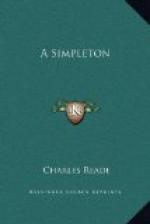She derived some comfort from Uncle Philip. His rough, friendly way was a tonic, and braced her. He called several times about the Bijou. Told her he had put up enormous boards all over the house, and puffed it finely. “I have had a hundred agents at me,” said he; “and the next thing, I hope, will be one customer; that is about the proportion.” At last he wrote her he had hooked a victim, and sold the lease and furniture for nine hundred guineas. Staines had assigned the lease to Rosa, so she had full powers; and Philip invested the money, and two hundred more she gave him, in a little mortgage at six per cent.
Now came the letter from Madeira. It gave her new life. Christopher was well, contented, hopeful. His example should animate her. She would bravely bear the present, and share his hopes of the future: with these brighter views Nature co-operated. The instincts of approaching maternity brightened the future. She fell into gentle reveries, and saw her husband return, and saw herself place their infant in his arms with all a wife’s, a mother’s pride.
In due course came another long letter from the equator, with a full journal, and more words of hope. Home in less than a year, with reputation increased by this last cure; home, to part no more.
Ah! what a changed wife he should find! how frugal, how candid, how full of appreciation, admiration, and love, of the noblest, dearest husband that ever breathed!
Lady Cicely Treherne waited some weeks, to let kinder sentiments return. She then called in Dear Street, but found Mrs. Staines was gone to Gravesend. She wrote to her.
In a few days she received a reply, studiously polite and cold.
This persistent injustice mortified her at last. She said to herself, “Does she think his departure was no loss to me? It was to her interests, as well as his, I sacrificed my own selfish wishes. I will write to her no more.”
This resolution she steadily maintained. It was shaken for a moment, when she heard, by a side wind, that Mrs. Staines was fast approaching the great pain and peril of women. Then she wavered. But no. She prayed for her by name in the Liturgy, but she troubled her no more.
This state of things lasted some six weeks, when she received a letter from her cousin Tadcaster, close on the heels of his last, to which she had replied as I have indicated. She knew his handwriting, and opened it with a smile.
That smile soon died off her horror-stricken face. The letter ran thus:—
Tristan D’ACUNHA, Jan. 5.
Dear Cicely,—A terrible thing has just happened. We signalled a raft, with a body on it, and poor Dr. Staines leaned out of the port-hole, and fell overboard. Three boats were let down after him; but it all went wrong, somehow, or it was too late. They could never find him, he was drowned; and the funeral service was read for the poor fellow.




